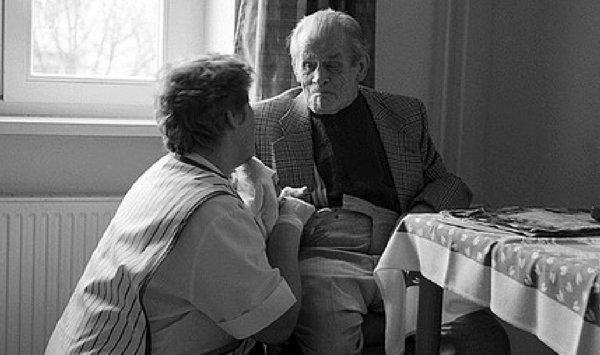The report released today by the Dilnot Commission on Funding of Care and Support sets out the need for the financial reform of the social care system in the UK. Coupled with the recent findings of the Equality and Human Rights Commission with regard to the home care of elderly, it seems as if social care in the UK needs to take a new direction. Angela Kitching describes a crucial element in the Japanese social care system which could make a difference in the UK – what is ikigai?
An older lady in a group home writes the Japanese word for ‘flower’ in calligraphy, whilst one of her friends chooses what she will cook for dinner: both of them are realising their ikigai. Ikigai is a Japanese word that translates as ‘that which makes one’s life worth living’. The first lady is practising an art form she has developed throughout her life and although, due to dementia, she cannot consistently identify her own family members, she is able to remember how to draw beautiful calligraphy. The second lady, in the early stages of dementia, needs help with some aspects of day-to-day life, but she wants to continue cooking her own food for as long as possible. She has told the live-in carers who support this group of six people living with various stages of dementia, that cooking for herself is important, so they ensure that cooking is an everyday activity and part of her long-term care plan.
As the country with the fastest ageing population in the world and with one of the highest longevity rates, Japan is the destination of many academics, politicians and economists who want to study its ageing population. Often the visitors have come away with the conclusion that identifying and realising your own purpose for living is a key feature of remaining happy in a long life. My own visit to Japan to look at the delivery of social care services for older people left me certain that ikigai is a useful concept to be guided by when trying to create space in the everyday delivery of care for a person’s own spirituality.
How is ikigai used in social care?
Ikigai is regarded by social care service providers as an ‘essential word’. Japanese social care has experienced a revolution in funding and provision since 2000 with the inception of the Long Term Care Insurance System. The scheme, introduced by the national government as a response to the demographic challenges Japan faces, has brought more money into the social care system and has increased equitable access to social care. It has also, for the first time allowed charities and private providers to deliver social care services, in contrast to the UK where 90% of residential social care is already contracted from independent providers. There are, therefore, new social care facilities opening across Japan. But even outside these high-tech havens, in the grey, state-provided long stay hospital dementia wards, identifying an older person’s ikigai was seen as a valuable part of their needs assessment and also a way of identifying their future goals. In practical terms, this meant that the older person receiving care was being supported by a staff member who had to attend to more than their functional needs; they also had to work with the patient towards achieving an aspiration. The staff member could justify time spent with an older person identifying and delivering quality care in an attempt to work towards enhancing their ikigai.
One of the great values of ikigai is that older people are humanised in the eyes of the staff working as caregivers. A ‘needs assessment’, including a self-assessment of ikigai, meant that an older person was able to express social, spiritual and emotional needs, as well as their functional needs, as they entered a social care service.
Helping to identify the aspirations of an older person experiencing the later stages of dementia is a difficult task, involving interaction with their family and close monitoring of their patterns of activity. But the concept of ikigai accentuates the need to give serious attention to this task, to promote real care of the older person and attention to their needs. It represents an attempt to find the whole person through the shattered pieces of their illness.
What is ikigai and is it spiritual?
Ikigai is associated with a sense of satisfaction that a person achieves by carrying out the activities which add meaning to their life. It is not usually identified with any religious philosophy, but neither is it entirely secular. In his useful article on the subject, Noriyuki Nakanishi says, ‘Needs associated with ikigai are not simply equal to the desires for biological satisfaction or the desires of humans as social creatures. They are individual desires of humans as spiritual beings.’ (Nakanishi N., 1999, ‘Ikigai in older Japanese people’, Age and Ageing, 28, 323-324) All those I have spoken to can name some aspect of their ikigai; examples given in my discussions with older people in residential social care settings about ikigai included contact with grandchildren or the desire to walk outside regularly. No-one mentioned material wealth as the thing that made their life worth living.
Ikigai does not merely express the satisfaction that a person currently experiences in their life; it is also a way of capturing their aspirations. Person-centred care planning, which is in use in some parts of the UK care system, involves a similar process of planning someone’s care based around their desires, but its application in older people’s social care is limited. I believe that ikigai offers a more complete attempt to consider someone’s life. Because ikigai is both about being and desiring to be, it takes on a metaphysical aspect – a person’s ikigai is a way of identifying what makes that person whole.
Ikigai and Catholic Social Teaching
It is useful to compare the potential and limitations of ikigai with the framework given in Catholic Social Teaching. Will this Japanese ‘space for the spiritual’ really amount to anything more than wish-fulfilment for those who are articulate, self-analytical and probably already able to get what they want from a social care setting? I would argue that ikigai does achieve more than this because it is available as a tool to be used by every person receiving care from a particular organisation and it is used to achieve tangible changes in the way care is given. Unlike other social care assessment tools regularly used in older people’s care assessments, it permits people to express something about what they can do or would like to do and sets no limits on what this could be. It helps to reinforce personhood in often impersonal institutional settings, or as The Catechism of the Catholic Church would have it, ‘the dignity of a person, who is not just something, but someone’ (371). It helps people receiving care to let their caregivers know that they are a real person who remains intact even when their body or mind may be failing them.
The limitation of ikigai is that it lacks an underlying philosophy and in theory people may use it to wish themselves and others ill. Just as an obvious limitation of human rights language is its use in law to defend freedoms that are morally suspect, so too ikigai may be subject to corrupt human desires. Although I have not uncovered evidence that it is being used in this way, if a significant number of people stated that their ikigai, their reason for living, was to seek a means to die then there is nothing inherent in the idea of ikigai which would argue this was not a legitimate aim.
The practical application of ikigai as I saw it demonstrated was always positive. Even when a person could no longer express their own wishes clearly, for example once they lacked mental capacity as a result of dementia, ikigai helped to ensure that their wishes were not ignored. Patterns of behaviour which could be tolerated and which helped to promote calmness or conversation (no matter how fractured) about someone’s life and wishes were valued because these were seen as indications of that person’s ikigai. I think that an ageing population, whose longevity and tolerance of chronic disability are increasing, are better protected ultimately by the presence in care settings of an idea that promotes the dignity of the human person, no matter how loose a concept this is. Ikigai is not a replacement for the minimum legal protection that human rights afford, nor for the aspiration to wholeness offered by religion, but it brings those who can be cut off by their illness, frailty or disability into relation as human beings with those who care for them, and by extension gives them a stake in the common good of society.
What difference could ikigai make in the UK?
In Japan, Buddhist, Shinto, Confucian and Christian philosophies are common and are intertwined. Harmony is sought between religions and many people see no conflict in choosing to be married in one tradition whilst professing another. Ikigai is a very Japanese concept because it creates a central space for a ruling philosophy without dictating what that space should be filled with. A person’s ikigai can be practical or ethereal, religious or secular. The reason the concept works so well is that it is able to translate so successfully into businesses, hospitals and care homes without presenting itself as a philosophy emerging from a single religious or cultural belief. This is typical of Japanese culture, which is willing to incorporate and blend cultural traditions and religious practices into everyday life. It is possible that the concept of ikigai would not be accepted in the UK where secular and religious boundaries are more fixed.
In the UK there is considerable anxiety about the emergence of spirituality in institutional or organisational settings. Despite a sizeable body of academic work and some excellent evidence of practical application in health or social care settings, spiritual support in UK institutions is usually provided by a chaplaincy service. It is only accessible to those who approach and accept its religious packaging and even then its legitimacy can be questioned as it is specific to a particular faith. Although the Japanese and British attitudes to spiritual space within everyday life are quite different, an approach based on something akin to ikigai could nevertheless find a place within UK health and social care settings because it creates clear benefits to the person receiving care, is individually determined in keeping with modern health and social care practice and, vitally, comes with a non-specific religious wrapper.
When older people in the UK are asked about social care services, anxiety about the quality of the service they receive is their primary concern. Ensuring older people are treated with dignity by underfunded services and low paid care staff who have increasingly little time, is a major barrier to guaranteeing good quality social care provision. A ‘tick box’ culture of meeting older people’s functional needs following a needs assessment has been blamed for staff members failing adequately to address social or emotional needs. Added to this, anxiety about offending people’s beliefs, or in some cases an unwillingness to acknowledge the presence of spiritual needs, can strangle attempts to see successful social care provision as caring for the whole person.
The social care system in the UK is in crisis: Andrew Dilnot’s newly published report into the future funding of social care acknowledges that the system needs major financial reform. A set of complex and unfair national and local policies means that too few people receive the care they need, and that entitlement to social care differs depending on location. Whilst there are many examples of excellent social care and support, too often quality care is sacrificed because there is insufficient funding to deliver a full package of care, and inadequately trained staff are being asked to provide care for highly complex needs. The terrible stories of the abuse of older people in vulnerable situations, given so much prominence in the media, are the tip of the iceberg. The interim report of the Equality and Human Rights Commission investigation into provision of social care at home found that older people’s human rights were routinely breached. Our care system is too often careless in meeting the needs of older people.
Politicians of all parties are beginning to take the reform of social care seriously. It is one of the very few issues on which Ministers and Shadow Ministers are calling for political consensus. There is a promise from the Government that new legislation will be forthcoming during the life of this Parliament.
Translating the ideas embodied in the concept of ikigai into the UK social care system might be a good place to start now that the Dilnot Commission on Funding of Care and Support has considered the financial architecture such a system will need. We must press politicians to look beyond this funding model, challenging them to start with ‘what makes a person’s life worth living’. People of all ages want more from social care than the fifteen minutes of washing and dressing that many currently receive. This will cost money; there must be an increase in staff numbers and training to improve quality. But we must not forget that better quality of care depends on establishing the right underlying aims. The postcard campaigns and petitions that will try to influence the outcome of social care reforms should challenge policy makers to identify their own goals, their own ikigai. We should write to them of our own dreams for the future. As we grow old, what will sustain us? What will we want to ensure remains a part of our lives? What habits would we want to be recognised by, even when we cannot express our desires? Striving for a system that values ‘the thing that makes one’s life worth living’ may be a good measure by which we can test the success of social care reforms.
Angela Kitching is a charity Government Relations Manager and a member of the editorial board of Thinking Faith.
![]() Dilnot Commission on Funding of Care and Support
Dilnot Commission on Funding of Care and Support![]() Equality and Human Rights Commission
Equality and Human Rights Commission
![]() ‘Care in the Community’ by Joe Egerton on Thinking Faith
‘Care in the Community’ by Joe Egerton on Thinking Faith






